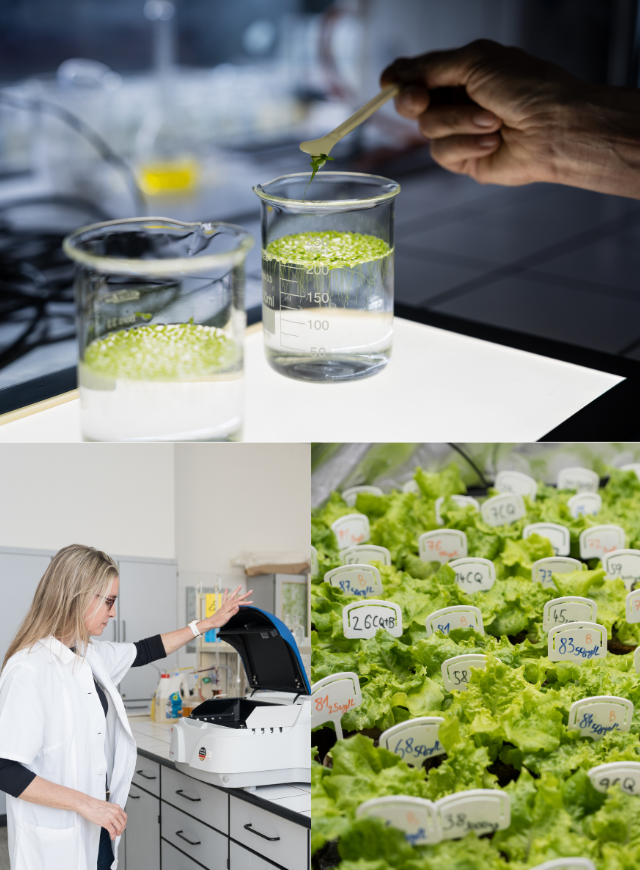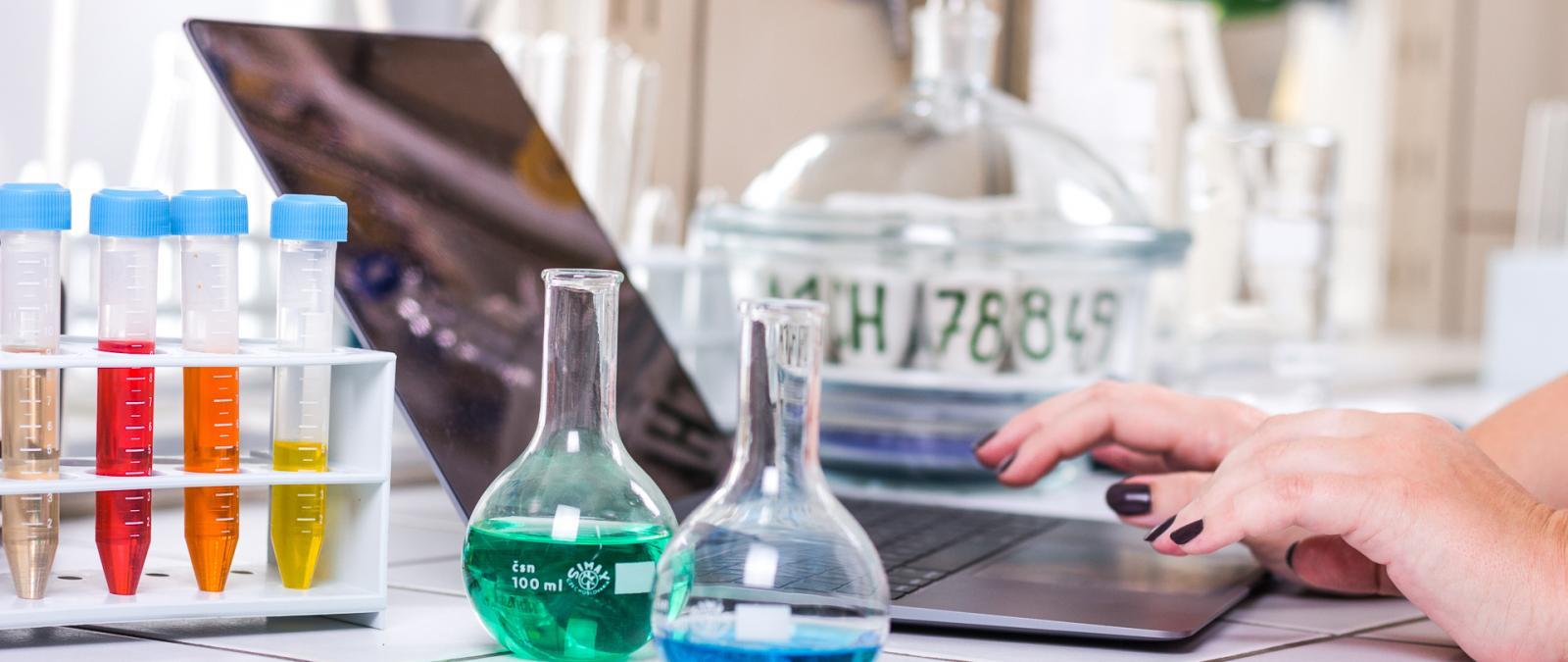Laboratoryofanalyticalandenvironmentalchemistry
In our laboratory, we focus applied and basic research in various areas of analytical and environmental chemistry. From the point of view of analyses, we work on qualitative, quantitative and structural determinations of inorganic and organic pollutants ranging from macro- to ultra-trace quantities. For this purpose, we apply advanced analytical techniques and top instrumentation, including ICP-MS or GC-MS/MS. An integral part of our research is the development of preconcentration and separation techniques. From the point of view of analytes and analysed samples, we monitor the content of pollutants (heavy metals, nanoparticles, microplastics, drugs, hormones) in water, soil, waste, samples from industry or transport and, finally, in biological material. For this purpose, it is necessary to develop advanced analytical methods. In our laboratory, we also investigate trace in-situ analysis and 2D imaging not only of geological samples, but especially of biological tissues.
In addition to the research in the field of analytical and environmental chemistry, we participate in the innovation of existing and the development of new technologies that contribute to the protection of the environment, the preservation of natural resources and ecological sustainability. In particular, these are air, water and waste treatment technologies.
Our laboratories are also equipped with devices for ecotoxicological tests in terrestrial and aquatic systems.

doc. Mgr.
Michaela Vašinová
Galiová
Ph.D.
Head of Laboratory
Research in the field of identification and characterization of organic and inorganic substances with the application and development of sample processing methods and advanced instrumental analytical techniques (SN/LA-ICP-MS).
Mgr.
MarieNovotná
Ph.D.
Contact person
Application of mass spectrometry and spectral methods for determination of inorganic analytes in inorganic, organic and biological matrices.
-
Research group
Ing.
KristýnaBilavčíková
Analysis of inorganic substances and organometallic compounds in biological systems.
Mgr.
MichaelaBahelková
Analysis of anorganic substances in the environment.
Ing.
VeronikaŘezáčová
Ph.D.
Basic analytical methods, electromigration methods in environmental analysis, study of properties of PCMs.
Mgr.
Helena Doležalová
WeissmannováPh.D.
Transport and fate of micropollutants in environmental components, plastics, application of AAS and FTIR methods in the identification and quantification of risk elements and micro/nanoplastics in environmental matrices.
Ing.
JosefKalivoda
Ph.D.
Development and optimization of chemical engineering facilities specializing in mass sharing in two-phase systems within air protection, water treatment and biogas production technologies.
doc. Mgr.
RenataKomendová
Ph.D.
Inorganic analysis of environmental pollutants. Water analysis, soil analysis, biological material analysis, waste analysis. Atomic absorption spectrometry, preconcentration techniques, monitoring, biomonitoring.
doc. MVDr.
Helena Zlámalová
GargošováPh.D.
Ecotoxicology and ecotoxicological tests in the field of protection of aquatic and terrestrial ecosystems.
Ing.
KlaudiaMatušková
Issues of air quality protection, the impact of combustion processes, and the characterization of particulate matter in terms of their chemical composition, size distribution, and potential effects on human health and the environment.
Mgr.
LenkaMádi
Ph.D.
Analysis of organic substances in the environment, GC-MS, LC-MS methods.
-
Research scope
- Development of methods for rapid analysis of properties, stability and dynamics of soil organic matter
- Properties of water and water bridges in soil processes and sorption of pollutants
- Biodegradation tests of polymers
- Development of methods for analysis of microplastics in soils
- Determination of heavy metals in soils and other matrices and the influence of heavy metal nanoparticles on soil properties, use of biomarkers for environmental risk assessment
- Development of preconcentration techniques for the determination of heavy metals
- Analysis of pollutants including residues of pharmaceutical substances, masks of compounds and artificial sweeteners in aquatic systems
- Ecotoxicological studies of the effects of selected substances on terrestrial and aquatic organisms
-
Selected projects
- Current:
- FW12010233 - Efficient microaeration for hydrogen sulfide reduction in biogas plant fermenters.
- Elimination of volatile substances from wastewater with simultaneous conversion into a secondary usable raw material using microporous hollow fibers
- Successfully completed:
-
Selected publications
- M. Hložková, M. Vašinová Galiová, P. Coufalík, K. Breiter, R. Škoda, M. Březina, M. Brtnický, J. Kynický. Determination of tin in geological materials using LA-ICP-MS: Seemingly simple analysis? CHEMICAL GEOLOGY, 2023, no. 641, ISSN: 0009-2541. (https://doi.org/10.1016/j.chemgeo.2023.121775)
- O. S. Vereshchagin, L. A. Gorelova, A. K. Shagova, A. Kasatkin, R. Škoda, V. N. Bocharov, N. S. Vlasenko, M. Vašinová Galiová. Re-investigation of 'minasgeraisite-(Y)' from the Jaguaracu pegmatite, Brazil and high-temperature crystal chemistry of gadolinite-supergroup minerals. MINERALOGICAL MAGAZINE, 2023, vol. 3, no. 87, p. 470-479. ISSN: 0026-461X. (https://doi.org/10.1180/mgm.2023.19)
- Breiter K., Vašinová Galiová M., Hložková M., Korbelová Z., Kynický J., Costi H.T. Trace element composition of micas from rare-metal granites of different geochemical affiliations. LITHOS, 2023, č. 446, ISSN: 0024-4937. (https://doi.org/10.1016/j.lithos.2023.107135)
- JEŽEK, S.; SÝKORA, J.; KOMENDOVÁ, R. Determination of platinum and palladium released from autocatalysts in soil samples from different sized urban agglomerations. International Journal of Environmental Science and Technology, 2024, roč. 1, č. 2024, s. 1-16. ISSN: 1735-2630. (https://doi.org/10.1007/s13762-023-05345-2 )
- KOMENDOVÁ, R. Recent advances in the preconcentration and determination of platinum group metals in environmental and biological samples. TRAC-TRENDS IN ANALYTICAL CHEMISTRY, 2020, č. 122, s. 1-12. ISSN: 0165-9936. (https://doi.org/10.1016/j.trac.2019.115708)
- FUČÍK, J.; AMRICHOVÁ, A.; BRABCOVÁ, K.; KARPÍŠKOVÁ, R.; KOLÁČKOVÁ, I.; POKLUDOVÁ, L.; POLÁKOVÁ, Š.; MRAVCOVÁ, L. Fate of fluoroquinolones in field soil environment after incorporation of poultry litter from a farm with enrofloxacin administration via drinking water. ENVIRONMENTAL SCIENCE AND POLLUTION RESEARCH, 2024, vol. 31, no. 13, p. (https://doi.org/10.1007/s11356-024-32492-x)
- PROCHÁZKOVÁ, P.; MÁCOVÁ, S.; AYDIN, S.; KALČÍKOVÁ, G.; ZLÁMALOVÁ GARGOŠOVÁ, H.; KUČERÍK, J. Effects of biodegradable P3HB on the specific growth rate, root length and chlorophyll content of duckweed, Lemna minor. Heliyon, 2023, roč. 9, č. 12, ISSN: 2405-8440 (https://doi.org/10.1016/j.heliyon.2023.e23128)
- ŠUDOMOVÁ, L.; DOLEŽALOVÁ WEISSMANNOVÁ, STEINMENTZ Z.; H.; ŘEZÁČOVÁ, V.; KUČERÍK, J. A differential scanning calorimetry (DSC) approach for assessing the quality of polyethylene terephthalate (PET) waste for physical recycling: a proof-of-concept study. Journal of Thermal Analysis and Calorimetry, 2023, roč. 148, č. 20, s. 10843-10855. ISSN: 1588-2926. (https://doi.org/10.1007/s10973-023-12430-8 )
- Other publications
-
Services offered
- Assessment of process efficiency for wastewater treatment using chemical and microbiological indicators
- Advanced oxidation processes for the removal of organic pollutants, especially hormones, from drinking water
- Optimization of pyrolysis processes for organic waste treatment, biochar production and characterization and applications
- Research on alternative energy sources, energy alternative materials and systems for energy saving in industry and households
- Biodegradation tests of bioplastics in freshwater, seawater and soil according to ISO methodology
- Analysis of hazardous elements in soil, water and organisms
- Ecotoxicological testing of products and waste materials according to OECD and ISO methodology
-
More about us
